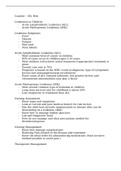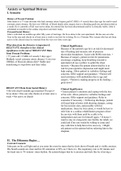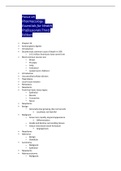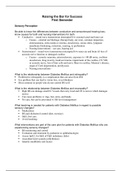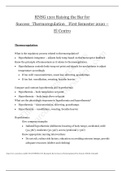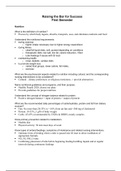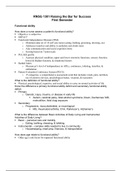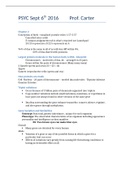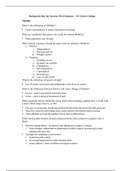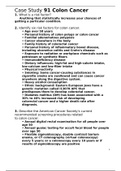El Centro College
Latest uploads at El Centro College. Looking for notes at El Centro College? We have lots of notes, study guides and study notes available for your school.
-
60
- 0
-
4
All courses for El Centro College
- Raising the Bar RNSG 1301 4
- Raising the Bar for Success RNSG 1301 2
- RNSG 1216 RNSG1216 5
- RNSG 1216 Skills Physical Assessment Module Quiz RNSG1216 2
- RNSG 1216 Skills Physical Assessment Module Quiz Latest 2021 1
- RNSG 1301 RNSG1301 5
- RNSG 1538 RNSG 1538 1
- RNSG 2360 RNSG2360 1
- RNSG 2539 1
- RNSG 2539 quizzes RNSG2539 1
- RNSG 2539/RNSG2539 RNSG2539 1
Latest notes & summaries El Centro College
OB PEDIATRIC/Comfort – OB, Pedi COMPREHENSIVE GUIDE(BEST SCORE)2020/2021 NEED TO KNOW - Epidural: possible side effects; know what to monitor after the epidural; what side should she lay on initially after the epidural? Nursing interventions - Know your non-pharmacologic labor pain interventions NEONATAL PAIN - Pain is both sensory and emotional experience - Babies can feel pain and express it through specific signs and symptoms
Anxiety or Spiritual Distress Case Study
PHARM EXAM 3 Focus on Pharmacology: Essentials for Health Professionals Third Edition/PHARM EXAM 3 Focus on Pharmacology: Essentials for Health Professionals Third Edition
Raising the Bar for Success First Semester Sensory Perception Be able to know the differences between conductive and sensorineural hearing loss; know causes for both and nursing interventions for both. • Conductive – sound wave transmission interrupted b/w external canal and inner ear o Causes – external ear blockage (foreign body, ear wax), cerumen impaction, cholesteatoma, otitis media or externa, otosclerosis, serous otitis, tympanic membrane thickening, retraction, scarring, o...
RNSG 1301 Raising the Bar for Success_Thermoregulation_ First Semester 2020 – El Centro Thermoregulation What is the regulatory process related to thermoregulation?
Raising the Bar for Success First Semester Nutrition What is the definition of nutrition? • Process by which body ingests, absorbs, transports, uses, and eliminates nutrients and food Understand the nutritional requirements: • during exercise o higher intake necessary due to higher energy expenditure • during illness o clear/full liquid diets, soft, pureed depending on conditions o therapeutic diets: low salt, low fat, calorie reduction, ↑fiber o tube feedings if issues...
RNSG 1301 Raising the Bar for Success First Semester Functional Ability How does a nurse assess a patient’s functional ability? • Objective vs subjective • IMPACT • Functional Independence Measure (FIM) o Minimum data set of 18 self-care items (eating, bathing, grooming, dressing, etc) o Addresses transfers and ability to ambulate and climb stairs o Also communication and social cognition items o Scoring based on 7-point scale • PULSES profile o Assesses physical con...
PSYC Sept 6th 2016 Prof. Carter Chapter 2 Conception of birth –visualized youtube video 1:57-5:57 Cancelled extra credit E-campus assignments tab is what’s required not Launchpad 20/25 repres ents a B 22.5 represents an A 96% of dna is the same in all of us with key diff within 4%, 60% of dna shared with possums. Largest protein molecule in the human body is DNA –blueprint Chromosomes – molecules of dna, 46 - arranged in 23 pairs Genes within the pairs of chromosomes (Many many many) 2 G...
Raising the Bar for Success: First Semester – El Centro College Mobility What is the definition of Mobility? • Factors that facilitate or impair movement of the body What are conditions that places one at risk for altered Mobility? • Older population, esp. females What clinical outcomes should the nurse look for related to Mobility? a. Positive i. Independence ii. Physical activity iii. Weight control b. Negative i. Swelling of Les ii. Dyspnea on exertion iii. Contractures i...
Case Study 91 Colon Cancer 1. What is a risk factor? Anything that statistically increases your chances of getting a particular condition. 2. Identify six risk factors for colon cancer. • Age over 50 years • Personal history of colon polyps or colon cancer • Familial adenomatous polyposis • Cancer elsewhere in the body • Family history of colorectal cancer • Personal history of inflammatory bowel disease, including ulcerative colitis and Crohn's disease • Exposure...

